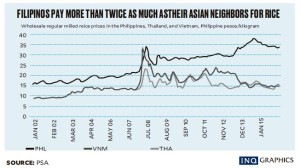In its first-ever press conference last week, the Philippine Competition Commission (PCC) announced it “is now investigating the power and cement industries.”
“We intend to exercise our enforcement powers in a way that is envisioned under the law, which is a muscular agency, not a paper-pushing, rubber-stamping agency,” said PCC Commissioner El Cid Butuyan.
The Cement Manufacturers Association of the Philippines reacted, saying they “follow very strictly the competition law and are very confident we can answer any allegations to the contrary.”
The developments remind me of an earlier column where I said that while our new competition law does not outlaw trade and industry associations, they should not be used as conduits for acts violating the law.
I proceeded to enumerate topics that could be discussed by trade or industry associations and their members. I also enumerated prohibited topics that, under no circumstance, should ever be raised. Examples are price-fixing, market or customer allocation and production output restrictions.
There are topics which, although do not directly violate the PCA when discussed, are nevertheless risky topics from a competition law perspective.
For instance, sharing of commercially sensitive information must be avoided. Examples of these include pricing elements such as terms of sale, discounts and rebates; planned price changes; sales revenues; customer lists; and R&D plans.
There are also suggestions on what to do if a competitor raises an inappropriate topic and/or provides commercially sensitive information.
Guidance from foreign jurisdictions with similar antitrust or competition laws suggests the following: (1) Immediately stop the conversation; (2) Point out it is your company’s policy to comply with the competition law; (3) If the person insists, immediately leave the meeting and ensure that your objection is documented; (4) Do not disseminate internally any sensitive information you have received; (5) Immediately inform your supervisor of the incident and explain your actions in writing; and (6) Determine, with the help of your legal staff, additional steps that need to be taken.
Other suggestions are: (1) Participate only in association meetings based on a detailed agenda and ensure that the discussions are limited to the items in the agenda; (2) If the agenda contains questionable items, discuss them with a legal staff knowledgeable about competition law prior to attending the meeting; (3) If the agenda contains “other matters,” be vigilant and leave the meeting if inappropriate topics or commercially sensitive information are raised or discussed and make sure your objections are put on record; (4) Promptly review minutes for accuracy especially matters relating to you and your company. If the minutes are not accurate, make sure that your correction is incorporated. If the correction is refused, insist your objection be recorded.
To avoid investigations by the PCC, it may do us well to read about best practices in foreign jurisdictions with similar competition laws, some of which have been pointed out in my previous columns. As PCC Commissioner Johannes Bernabe said: “We look at it from the prism of competition and whether the elements of collusive practice, which would qualify as anticompetitive agreements, are present.”
(The author may be contacted at: francis.ed.lim@gmail.com)


